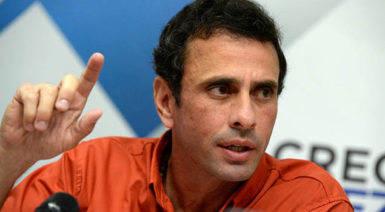CARACAS, (Reuters) – Venezuela’s move to bar two-time presidential candidate Henrique Capriles from public office for 15 years looked like an unusually brazen blow at the opposition but is just the logical extension of a strategy that has emerged as the last, best hope of President Nicolas Maduro’s Socialists for maintaining power.
A nearly identical manoeuvre was used ten years ago to halt the rise of former mayor Leopoldo Lopez, who in polls remains one of the most influential opposition leaders despite being jailed three years ago for his role in anti-government protests.
The situation suggests the Socialists may continue to lean on Comptroller Manuel Galindo, accused by the opposition of being a government puppet, to clear the playing field of potential challengers. The election, still unscheduled, must be held by the end of 2018.
Maduro is struggling under low approval ratings and Soviet-style product shortages, but so far the opposition has failed to find a way around the Socialists’ domination of the top court and other state institutions that have found one excuse after another to sideline them.

Capriles, responding to the ban in the company of other opposition leaders, signaled as much.
“My dear friends – Henry, Freddy, all of you who are here – today it’s me, but tomorrow they’ll come for you,” he said, in reference to high-profile legislator Henry Ramos and deputy congress chief Freddy Guevara.
Other Maduro challengers include Julio Borges, a lawyer and long-time politician who is currently the head of congress, and Henry Falcon, the governor of the central state of Lara who defected from the Socialist Party.
None of the other opposition leaders have the profile or influence of Capriles or Lopez, and all could be subject to disqualification.
The government maintains that Capriles and Lopez are dangerous activists seeking to rile up crowds to prepare the ground for a foreign intervention in Venezuela, home to the world’s largest crude reserves.
Some Latin American governments, the United States and international organisms harshly criticized the ban on Capriles, though they may lack leverage to get Venezuela to reverse it.
“(This move) is typical of a dictatorship that violates civil and political rights,” said Luis Almagro, secretary general of the Organization of American States, who has called for sanctions against Venezuela if it does not hold elections.
Venezuelan authorities did not respond to a request for comment.
The move against Capriles may further radicalize opposition street protests, which increasingly appear to be the only option available as they see themselves at growing risk of being sidelined.
But demonstrations have done little to dent Maduro’s grip on state institutions including the armed forces and the Supreme Court, which briefly assumed the powers of the opposition-led Congress in March before backtracking in the face of international condemnation.
Venezuelans struggle to make ends meet under triple-digit inflation, ubiquitous supermarket lines and constant scrambles to find food and medicine. Few economists expect a short-term improvement to the situation because Maduro’s government has repeatedly avoided reform measures such as lifting the exchange controls that could bring back economic stability.
The elections council in recent months has required opposition parties to “revalidate” themselves through petition drives in which they must collect a minimum number of signatures or be dissolved.
The main parties say they collected the necessary signatures to remain on the rolls, but they could still be eliminated if the council in the coming months discards significant numbers of signatures as it has in past petition drives.
Powerful Socialist Party Vice President Diosdado Cabello has also called for the dissolution of the opposition’s Democratic Unity coalition, which could leave Maduro’s adversaries without a party platform in the 2018 vote.
The elections council, which has repeatedly favored Maduro’s government, has not set a date for state governors’ elections that were supposed to take place last year.
Most believe the council will hold the presidential election, but many wonder aloud who will be able to run in it.
“This is a butcher shop and each of us has been given a number: some of us will be exiled, some of us will be detained, some of us will be disqualified,” said Guevara, the legislator, in a recent press conference.








